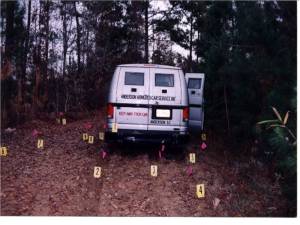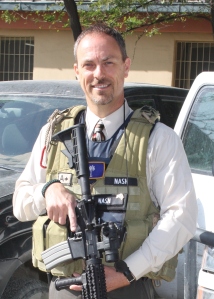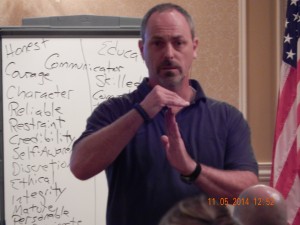Category Archives: The Character Connection
 Shortly after I took office as Sheriff of Dorchester County, we experienced a tragic crime. An armored-car was hi-jacked and one of the guards brutally murdered. Due to an intense investigation and some top-notch forensic work, we were able to identify the murderer and successfully prosecute the case.
Shortly after I took office as Sheriff of Dorchester County, we experienced a tragic crime. An armored-car was hi-jacked and one of the guards brutally murdered. Due to an intense investigation and some top-notch forensic work, we were able to identify the murderer and successfully prosecute the case.
Right after the jury came in with their verdict, I sought out my Detective Sergeant (now a Lieutenant) who had handled the crime scene and forensic portion of the case. I knew the conviction was largely due to his efforts and I wanted to recognize him for a job well-done.
So I found him out back of the courthouse and went up to praise him as any good Sheriff should. But instead of praising him for his achievement (gaining the conviction), telling him “good job,” or “keep up the good work,” I praised him for three character qualities. By “pitching” these character qualities, right across the plate so he could catch them, I made the “character connection” and ensured that I sent the right message.
Gaining the conviction was the achievement–the fruit. Character qualities like attentiveness, thoroughness, and diligence were the seeds that produced the fruit. If you focus on the fruit and neglect the seed, you can produce a bad crop. It’s the Law of the Harvest. According to our Character Maxim, if you focus on achievement to the exclusion of character, you encourage bad character.
Watch this short video excerpt from the Police Dynamics Video Training Series as I demonstrate how to use character-based praise to encourage high achievement.
Praising character over competence requires a new vocabulary. The 49 character qualities defined by Character First provide an excellent tool.
Do you remember your first pursuit? Most police officers do. They can turn out really good or they can turn out really bad. As law enforcement leaders, we can use character-based praise to help minimize the potential disasters associated with high-speed police pursuits.
In this short clip from the Police Dynamics Video Training Series, I use the story of a Rookie’s Pursuit to illustrate just how important it is to praise the character that produced the achievement rather than the achievement itself.
In this illustration, the Rookie exercised the character quality of self-control:
rejecting wrong desires and doing what is right.
His self-control is what kept his own emotions in-check and maintained his composure so he could make good decisions under pressure.
The Character Training Institute defines Determination as:
purposing to accomplish right goals at the right time, regardless of the opposition.
Watch this heart-warming video of a young girl whose determination allowed her to overcome an incredible obstacle in order to reach her goals in life.
Click here to download the full list of the 49 character qualities and their definitions.

The character quality of the month is Sensitivity, which the Character Training Institute defines as:
Perceiving the true attitudes and emotions of those around me.
Think about it from a street survival perspective for a minute. Perceiving the true attitudes and emotions of a criminal suspect can be the difference in life or death. We call it “street savvy” or “street sense,” but the character quality of sensitivity can give you more protection on the street than your ballistic vest…!
(Which I am grateful to have when I am roaming around the streets of Afghanistan…)
A heart-warming story about a man’s love and availability…
Availability vs. Self-Centeredness:
Making my own schedule and priorities secondary to the wishes of those I serve
http://www.youtube.com/watch?v=5e4caLZUrFw
A little bit out of the norm for the Police Dynamics blog, but I couldn’t help but think just how determined this drunk was to hang on to his beer…!
The working definition we use for Determination comes from the Character First! curriculum. It says that determination is:
Purposing to accomplish right goals at the right time, regardless of the opposition
Of course you have to question his choice of goals in this video, but you can’t question his commitment…!
Law enforcement and leadership are full of obstacles. In his book Challenging the Law Enforcement Organization: Proactive Leadership Strategies, Jack Enter calls leadership the “path of most resistance.” (I have heard Jack speak on numerous occasions and am very impressed with his humor, communications skills, and insights into police leadership. I highly recommend him as a consultant and motivational speaker.) Jack promotes determination in the face of opposition as a key character quality for effective police leadership.
I am currently reading Larry Kreider‘s new book, the 21 Tests of Effective Leadership. Larry makes the same point. He says discipline is the key to passing the Perseverance Test:
“Discipline is what keeps us going forward when our emotions are saying something different. Discipline is what causes us to ‘order our steps’ and face our fears… Discipline keeps our thoughts and emotions on track when circumstances around us would dictate otherwise.”
And I’ve often found myself saying “The undisciplined life is not worth living.”
If only we could demonstrate the level of determination demonstrated by this drunk in accomplishing some of our “right goals.”
People are quick to say that ethical matters are not always black and white, but often gray. My counter is that I don’t think it’s a matter of grayness. Grayness is just our lack of information or our lack of understanding of the underlying ethical principles.
It’s like looking at a black and white photograph in a newspaper. At first glance, there appears to be a lot of gray. But pull out a magnifying glass and look closer. What do you see? A bunch of black dots on a white background. So what appears to be gray on the surface is really just black and white when we analyze it more closely.
Ethical situations can be a lot like the photo. We sometimes have to pull out our “ethical magnifying glass” if we are to see and understand the underlying principles more effectively. Once we can bring the black and white into focus, our ethical decisions become easier.
I was reminded of this principle earlier today when I read a post by Jack Marshall on the Ethics Alarm Blog Site (an excellent resource for ethics-based leadership, by the way). Police Dynamics and the principles of good character help us to keep that magnifying glass polished so we can make better ethical decisions.
An obituary sent to me by a friend that requires no further comment:
Today we mourn the passing of a beloved old friend, Common Sense, who has been with us for many years. No one knows for sure how old he was, since his birth records were long ago lost in bureaucratic red tape.
He will be remembered as having cultivated such valuable lessons as:
- Knowing when to come in out of the rain;
- Why the early bird gets the worm;
- Life isn’t always fair; and
- Maybe it WAS my fault.
Common Sense lived by simple, sound financial policies (don’t spend more than you can earn) and reliable strategies (adults, not children, are in charge).
His health began to deteriorate rapidly when well-intentioned but overbearing regulations were set in place:
- Reports of a 6-year-old boy charged with sexual harassment for kissing a classmate;
- Teens suspended from school for using mouthwash after lunch;
- A teacher fired for reprimanding an unruly student, only worsened his condition.
Common Sense lost ground when parents attacked teachers for doing the job that they themselves had failed to do in disciplining their unruly children.
It declined even further when schools were required to get parental consent to administer sunscreen or an Aspirin to a student; but could not inform parents when a student became pregnant and wanted to have an abortion.
Common Sense lost the will to live as the churches became businesses; and criminals received better treatment than their victims.
Common Sense took a beating when you couldn’t defend yourself from a burglar in your own home and the burglar could sue you for assault.
Common Sense finally gave up the will to live, after a woman failed to realize that a steaming cup of coffee was hot. She spilled a little in her lap, and was promptly awarded a huge settlement.
Common Sense was preceded in death
- by his parents, Truth and Trust;
- by his wife, Discretion;
- by his daughter, Responsibility and
- by his son, Reason.
He is survived by his 4 stepbrothers:
- I Know My Rights
- I Want It Now
- Someone Else Is To Blame
- I am a Victim
Not many attended his funeral because so few realized he was gone…
You are going to LOVE this short video by Kim Alyn! I first met Kim when she conducted a training conference for the SC Sheriff’s Association a few years ago while I was still in office. I was most impressed by her enthusiasm, commitment to character, and lively presentation. Her message is dead on and exactly in line with the character-based principles of Police Dynamics.
This Up Time! video is just awesome. It is very clever and right on point. I know you will enjoy it. You can learn more about Kim at the Kimberly Alyn website.
The new Police Dynamics blog has already generated some interest after only 24 hours! Thanks to those of you who have taken the time to subscribe and to comment.
One of the topics I see talked about a lot in the blogosphere is the definition of character. We can go to the dictionary but a good working definition is a bit elusive. It’s a lot like pornography — you know it when you see it (I know, bad example. But there was actually a Supreme Court decision that ruled that way…).
Or maybe more importantly — you know it when you don’t see it.
Either way, it’s sometimes hard to pin down a definition.
I’ve heard this one quite a bit: “Character is who you are when no one else is around.” This captures a piece of the pie, but I like to add “… and you don’t think you’re going to get caught!”
The definition I have used in Police Dynamics training over the years comes partially from the folks at the Character Training Institute. They say “character is the inward motivation to do the right thing regardless of the circumstances.” I like this definition, too. But it was pointed out to me in a recent comment that this is a description of “good character,” because your character can be either good or bad.
I also like to add to this definition the following phrase – “… and regardless of the costs.” Because sometimes doing the right thing might cost you something. It could cost you a friend; it could cost you a court case; or it could cost you your job. Men and women of true character are willing to pay the price.
Many of you have already paid the price of good character many times over, and I applaud you for it. Thanks for setting such a good example. And feel free to share some of your experiences here, by the way.
And be sure to keep track of my blog by subscribing to the email feed for future posts. I’ve got some more good stuff coming.
And remember to “Keep up the good character!”
Sheriff Ray



